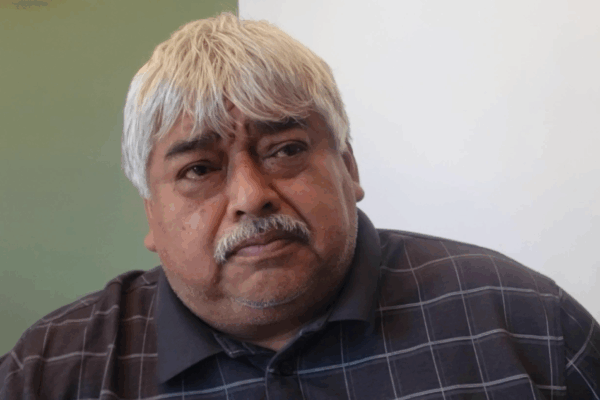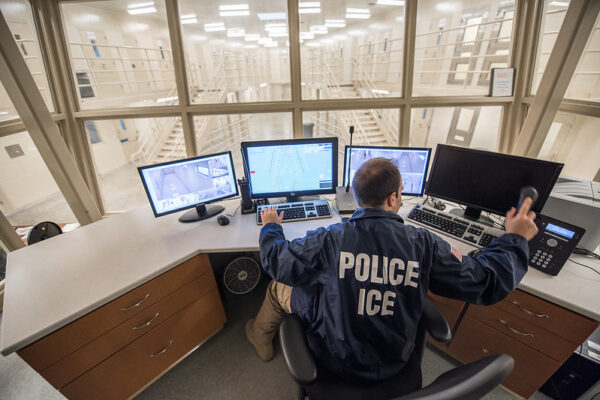Update December 2020: The ACLU of Texas staff is saddened to learn of the recent passing of our client Román Vázquez. Mr. Vázquez was in Immigration and Customs Enforcement detention at the Montgomery Processing Center for three months until his release in April 2020. In July, we published the story below in which he detailed the horrific conditions of his detention. We are glad that Mr. Vázquez was able to spend his last months with his family, to whom we send our deepest condolences. We will continue to fight for the release of more detainees from the threat of COVID-19 in immigration detention through our case, Vázquez Barrera et al v. Wolf, to which Mr. Vázquez lent his name as the lead plaintiff.
A silver-haired man, 59 years young, Roman Vazquez doesn’t remember much about living in Mexico. It’s hard to remember because he’s lived in the U.S. for so long, more than 30 years, in Texas for 18 of those years. He considers Texas his home, as do his five adult children and 13 grandchildren, all of whom are U.S. citizens.
Mr. Vazquez has lived a quiet life over the last few decades. He’s grown a family and worked hard in various construction roles; he’s a dedicated friend and faithful congregant in his church. His voice beams while describing himself as honest, loving, and accountable to his word.
All that he worked for seemed to fall apart when in late February, after returning home from a normal vacation to Mexico, Mr. Vazquez encountered a Customs and Border Protection (CBP) officer at the airport who decided to take him into custody for a nearly 15-year-old misdemeanor. The officer acted despite the fact that Mr. Vazquez is a U.S. legal permanent resident — someone who never had issues with CBP upon returning to the U.S. from vacation — and despite the looming threat of COVID-19 in Immigration and Customs Enforcement (ICE) detention centers.
Mr. Vazquez was swiftly taken to a massive ICE detention facility in Conroe, Texas, the Montgomery Processing Center (MPC) — just north of Houston — where his nightmare began. There, he spent three months during a time when COVID-19 was just beginning to spread like wildfire. Because of the way immigration law works, he did not have a legal right to ask an immigration judge for release or bond. His only way out was through the very agency that decided to detain him. His five children rallied to hire an attorney, but the message he received was clear: Mr. Vazquez would be detained at the MPC facility until the federal government decided it was time for him to leave.
A recent report from the Department of Homeland Security’s (DHS) own internal watchdog shows just how little ICE is doing to protect people in custody from the pandemic; people who could be awaiting their civil immigration case proceedings in quarantine, in their own homes. The impacts of this type of civil detention are already strenuous, as another recent ACLU report has found. While studies show that 99.9% of individuals will return for court when represented by an attorney, thousands are instead detained, where they suffer from being taken away from their families and communities. But we aren’t living under normal circumstances; we’re living through a pandemic, one that is still raging throughout Texas and around the world.
The conditions of the MPC facility, contrary to what DHS has claimed, are far from what health experts have recommended to stop the spread of COVID-19. Mr. Vazquez confirmed the rumors coming from the detention center: 80 people crowded into a single dorm, without the ability to physically distance, including people with flu-like symptoms. He contracted pneumonia during his initial detention and says he did not receive adequate medical care while suffering from the illness.
The official word inside the Montgomery Processing Center was that no one was sick, perhaps a result of the “code of silence” officers seemed to have. And if “no one was sick,” maybe that was one of the reasons why there were no masks or hand sanitizer provided to detainees, only hotel-size shampoo bottles to wash their hands and bodies with. Soap was only available for purchase. Of course, we know DHS knew COVID-19 was spreading through its facilities, and even into the larger community in Montgomery County, but were doing very little about it.
Dealing with pneumonia was already horrible, but Mr. Vazquez was even more worried that COVID-19 seemed to affect people more with underlying health conditions. He suffers from asthma, sleep apnea, high cholesterol, blood clots, and diabetes. He realized that if he contracted the virus, it could be a death sentence like it has been for others caught in ICE facilities.
He was finally released thanks to the work of his immigration attorney and ACLU of Texas attorneys advocating for him. But he still has anxiety and nightmares about the three months he spent in detention, away from his family, church, and community. Mr. Vazquez remembers what it was like in detention with no way out. He says his wife and children were all very upset, and that for him, “The worst thing that can happen is having your liberty taken away.”
The ACLU of Texas, along with partners, filed a class action lawsuit on behalf of all medically vulnerable individuals at the MPC facility. This week, we added to the lawsuit nine more people who are medically vulnerable and in severe danger due to COVID-19. While the case winds on, lives continue to be at stake.
That’s why we call on ICE officials to use their authority and immediately release people being detained, to save lives, to do what’s right for those who simply want to go home to their families and safely await their day in immigration court. Far from the threat that COVID-19 poses in the mass cages we call ICE detention facilities.



